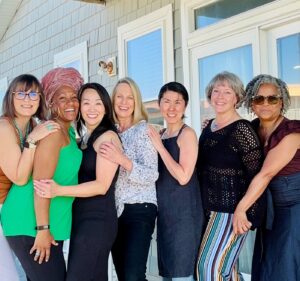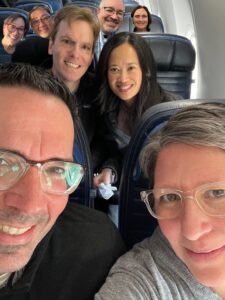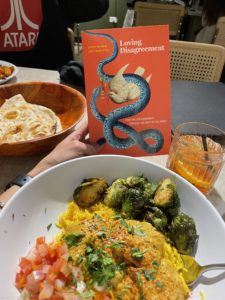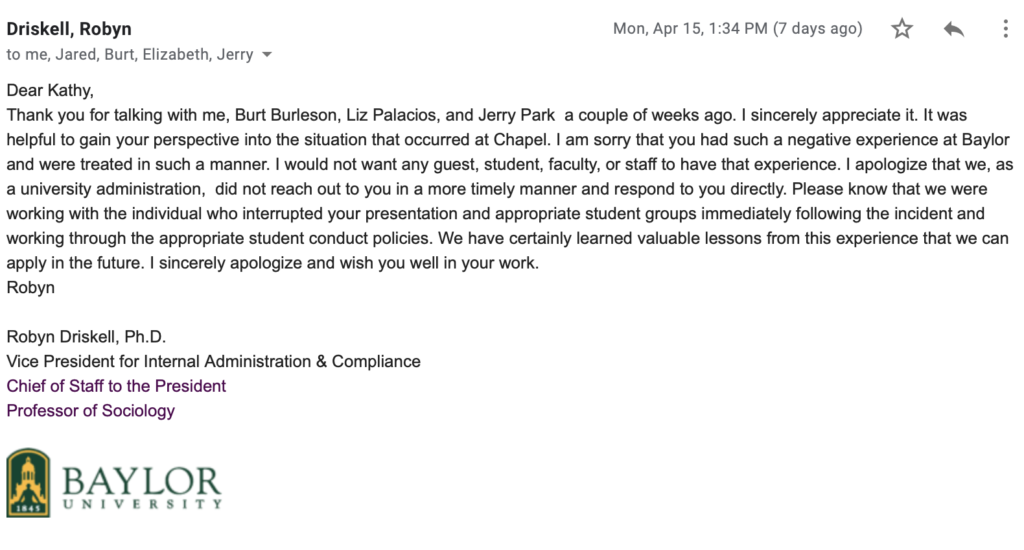Suggesting churches should drop online services as we move into the third year of the global pandemic is ableist AND racist.
It’s a matter of accessibility for ALL people, including the complicated issue of whether or not a congregation can afford to have a physical space and/or resources to livestream a church service. It’s a matter of not only opening physical doors that often go locked during the week but also creating and imagining spaces without doors, at the very least, different doors, so that all can enter and exit. It’s a matter of addressing the reality that the Church and the pandemic are GLOBAL and not just situated in the U.S. or North America and not just around the comfort around a theology enmeshed with white supremacy.
I don’t like teaching virtual yoga or preaching to a screen
I am a yoga teacher, and March 2020 impacted yoga studios in similar ways to churches. Our “audience” had always been in person, sometimes uncomfortably close to the person next to us. Honestly I found myself moving my body much more in yoga studio than in church, and for the talk around embodiment being about physically being in a room together the most movement I often experienced in a white-centered church service was the passing of the peace (I hate that part, TBH), the occasional swaying from side to side and awkward clapping or raising of hands during musical worship, and communion if the congregation was invited to walk through the center aisle to receive the elements.
In the yoga studio everyone is invited to move together, breathe together, rest together. We turn, twist, invert. We balance and sweat. We listen to our bodies and our breath. Sometimes, students linger and ask questions about a posture or a cue, and they mill about not unlike fellowship time in church spaces.
But back to March 2020 when the world felt like it stopped and so many of us learned to use and hate the word “pivot”. Pastors and yoga teachers learned the intricacies of a virtual space and how to translate community into a virtual space. What I would argue is that as a yoga teacher I learned more than the average church pastor or worship leader about translating embodiment not only of individuals but of a community into a virtual space and how to maintain that over time.
In June of 2020 as the “racial uprising” caught the attention of media, I started a virtual yoga space just for BIWOC because that’s the community I saw being most impacted and in need of something I could create. I thought that space would last a few weeks, a few months tops. We still meet weekly, most of the women who come to class I’ve never met in person. We have established rituals and expectations. We have cried together and created a space to talk or type or sit in silence. We have seen each other’s backgrounds – bedrooms and living rooms, and watched children and pets and housemates walk into the room. Everyone is free to turn off their cameras, and I am learning how to guide this incredible group of BIWOC while keenly aware of our diversity – size, ability, age, mobility, etc. We will never be in a physical space together and yet there is community.
Community is embodiment.
There is an “I” in embodiment but that’s not the point
Embodiment isn’t limited to our individual bodies and the sharing of physical space, especially as people of faith, Christians who believe God’s love and care for the universe and humanity transcends time, space, and our understanding. As Christians we say we are the body of Christ, in fellowship with our siblings across the globe, but if we cannot ever be in their physical presence does that make that fellowship less than what one might experience in person? If the Church and church is to love God and our neighbors as the New York Times op-ed author Tish Harrison Warren writes (and I agree), how can we possibly love our neighbors if churches shut the virtual door?
Let’s be clear. Choosing a place of worship has always, ALWAYS, involved a degree of personal preference. Let’s not kid ourselves, my Dear Readers. Denominations. Style of musical worship. Location. Convenience. Sound of the preacher’s voice (yes, we checked out a local church and I could not handle the preacher’s voice.) Children’s ministry options. Time of worship service. (And again, there are so many parallels to how students choose a yoga studio but I digress.)
And for people of color our choices have always been limited because of WHITE SUPREMACY that was built in to the foundation of the United States AND the churches established in this country. For the disabled the choices have always been limited. For those on the margins of what is deemed “normal” and “good” in the world we live in and most often in the church, OUR CHOICES HAVE ALWAYS BEEN LIMITED.
So to point to the virtual door that was opened out of necessity should be seen as an opportunity for church leaders to pause and reflect. Who walked through your virtual doors who would never have been able to walk through your physical doors? Are we not worthy of being your neighbors because you met us through a screen?
The body of Christ in wine and stale crackers
At some point in the global panini, my virtual community started sharing photos of what they pulled together for communion. It was a beautiful table of elements that reflected the body of Christ in one of the most embodied ways because it reflected individuals and families, what they were going through at the time.
No time to shop for wine or grape juice and crackers? Fine, how about sparkling water and chunks of a bagel? Or tea and some rice? Juice box and goldfish crackers? Coffee and gluten-free brownies? None of that was shared in person, and if our understanding of embodiment is limited to always sharing physical space then there was a whole lot of breaking church rules and theology in those virtual communion services.
I didn’t reach my hand into the plate of broken matzo that my neighbor in the pews had also just reached into. I didn’t breathe over the tray of non-recyclable plastic communion shot glasses with grape juice and pass it to my neighbor. I didn’t walk up the center aisle and receive the elements from a pastor or lay leader who could look into my eyes. I sipped my coffee and ate my danish as I watched others take the elements they were able to find in they pantries and refrigerators, an intimate look into their homes and lives. Did we not meet God in an embodied way?
Not all churches, Kathy
I’m not writing this to argue the minutia of why YOUR church can’t afford to keep streaming services or why YOUR church never got the hang of virtual church. Again, the reality is complicated because not all churches could afford their own buildings in the first place, let alone afford the technology to run a slick livestream service. The reality is very few churches ran slick livestream services period, wink, wink, and there is beauty in that. Dropped streams, being on mute, poor lighting all point to the challenges of embodied INDIVIDUALS doing and being something collective. It’s a different way of being embodied outside of a communal physical space but within the imagination of what could community look like when it’s not bound by walls and geography.
Opening the virtual doors gave churches an opportunity to see who wasn’t able to join in physically, even before the pancetta, and an opportunity to learn how technology could add closed captioning and allow individuals to turn up the volume or just follow the audio stream. People could join from their beds or backyards across time zones and man-made borders.
Some church leaders found virtual services as an opportunity to learn new-to-them technology – perhaps from younger congregants or congregants whose interests and gifts were in untapped spheres. Churches invited new voices to preach from the pulpit. How many times have we heard church leaders say they would love to invite diverse speakers as guest preachers but don’t have the funds? If you are still running a virtual service option you can still pay guest preachers well and skip the plane ticket and hotel. Fewer excuses, but maybe some churches want to keep that as an excuse? How many times have you as an individual wanted to hear from diverse, global voices but can’t get to that conference or buy all those books? Virtual services allow you to do just that.
I’m not suggesting churches do away with physical, in-person services, but this is a chance to rethink community to consider how our physical bodies and needs and the holy space of church can be one that works towards welcoming all to the table by creating new tables of virtual breakout rooms and physical spaces. If having a physical nursery is supposed to welcome families with infants into church as an option, why not keep the virtual sanctuary open because even when this pan flute is relatively under control we will still have siblings among us who would benefit from that virtual sanctuary and because they benefit WE BENEFIT. Without them we are incomplete.
Not all churches and not all people will want a virtual service, but what has been made clear is that there is a need and desire for this kind of creative access to church and it is embodied, just not in the way our limited understanding has conceptualized and executed it to date.
Can the Church and church hear, see, taste, smell and touch that kind of community beyond the limitations of a physical shared space? Isn’t that part of the invitation for all churches and the Church?



